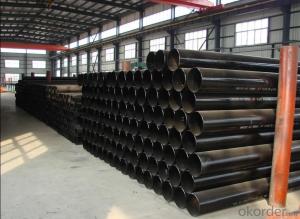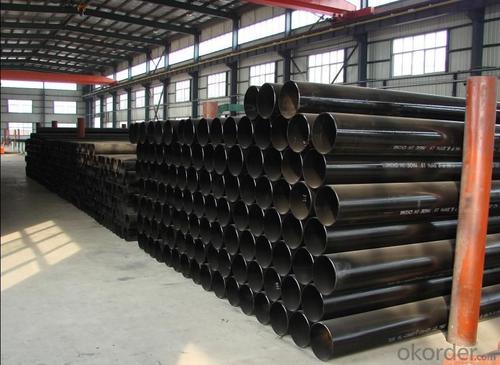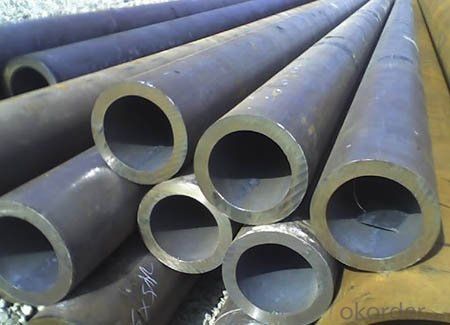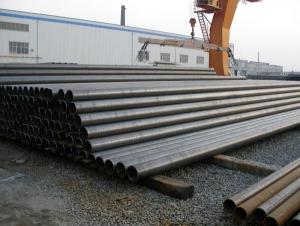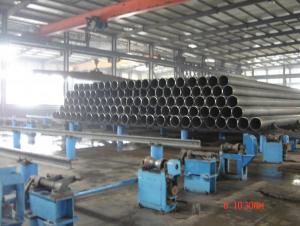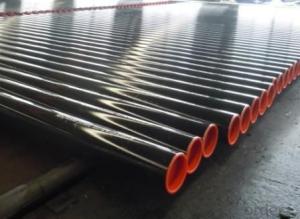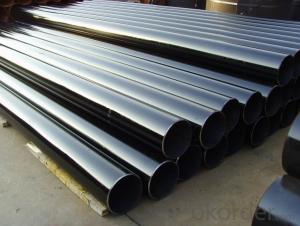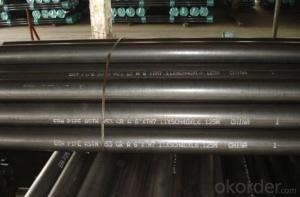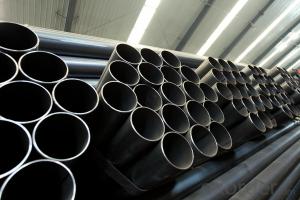API 5L ERW LINE PIPE
- Loading Port:
- China Main Port
- Payment Terms:
- TT or LC
- Min Order Qty:
- -
- Supply Capability:
- -
OKorder Service Pledge
OKorder Financial Service
You Might Also Like
1、Structure of Welded Steel Tube:
Welded Steel Tube is formed by drawing a solid billet over a piercing rod to create the hollow shell. We will provide you high quality of welded pipe and professioanl service.
2、Main Features of the Welded Steel Tube:
• High manufacturing accuracy
• The higher strength
• The small inertia resistance
• Strong heat dissipation ability
• Good visual effect
• Satisfy price
3、Welded Steel Tube Specification:
Standard | GB, DIN, ASTM ASTM A106-2006, ASTM A53-2007 |
Grade | 10#-45#, 16Mn 10#, 20#, 45#, 16Mn |
Thickness | 8 - 33 mm |
Section Shape | Round |
Outer Diameter | 133 - 219 mm |
Place of Origin | Shandong, China (Mainland) |
Secondary Or Not | Non-secondary |
Application | Hydraulic Pipe |
Technique | Cold Drawn |
Certification | API |
Surface Treatment | factory state or painted black |
Special Pipe | API Pipe |
Alloy Or Not | Non-alloy |
Length | 5-12M |
Outer Diameter | 21.3-610mm |
Grade | 20#, 45#, Q345, API J55, API K55, API L80, API N80, API P110, A53B |
Standard | ASME, ASTM |
1) Material:20#(ASTM A 106/A53 GRB.API5LGRB,GB),45#,16Mn,10#.
2) Specification range:OD:21.3-610mm,WT:6-70mm,length:6-12m or according to the requirement of clients.
3) Excutive standards:GB,ASME API5L.ASTM A 106/A53,Despite of the above standards,we can also supply seamless steel pipe with standard of DIN,JIS,and so on,and also develop new products according to the requirements of our clients!
4) Surface:black lacquered,varnish coating or galvanized.
5) Ends:Beveled or square cut,plastic capped,painted.
6) Packing:bundles wrapped with strong steel strip,seaworthy packing.
4、Packaging & Delivery
Packaging Details: | seaworthy package,bundles wrapped with strong steel strip |
Delivery Detail: | 15-30days after received 30%TT |
5、FAQ of Welded Steel Tube:
①How is the quality of your products?
Our products are strictly in accordance with international and domestic standard. We test on every pipe before delivery. We promise 100% refund if our products are not the same with our description. Any quality certification or testing report you want to see, please tell us.
②How about the price?
Yes, we are offering you the lowest price since we are factory. If you are interested in bargain, just don’t waste your time. Our quotation is professional.
③Why should you choose us?
We can also offer professional products inquiry, products knowledge train (for agents), fast goods delivery, outstanding customer solution proposals. Our service formula: good quality + good price + good service=customer’s trust.
SGS test is available. Customer inspection before shipping is welcome. Third party inspection is OK.
6、 Welded Steel Tube Images:
- Q: How do steel pipes compare to ductile iron pipes?
- Steel pipes and ductile iron pipes are utilized in various applications, but they possess distinct differences in terms of their properties and advantages. 1. Strength and Durability: Steel pipes exhibit greater strength and durability compared to ductile iron pipes. Steel possesses a higher tensile strength, making it less susceptible to cracking or breaking under pressure or external forces. Conversely, ductile iron possesses a lower tensile strength but boasts better impact resistance than steel. 2. Corrosion Resistance: Steel pipes are susceptible to corrosion, especially when exposed to moisture or chemicals. Nevertheless, protective measures such as applying coatings or employing corrosion-resistant alloys can safeguard against this. Ductile iron pipes, while inherently more corrosion-resistant than regular cast iron, may still necessitate external protection to prevent rusting and degradation. 3. Flexibility: Ductile iron pipes offer greater flexibility than steel pipes. They can endure certain degrees of bending and deflection without fracturing, making them suitable for applications where ground movement or shifting may occur. Conversely, steel pipes are less flexible and more rigid, rendering them better suited for straight runs or applications with minimal movement. 4. Cost: Generally, ductile iron pipes are more cost-effective than steel pipes. The manufacturing process for ductile iron is easier and cheaper, resulting in lower production costs. However, steel pipes may possess a longer lifespan, requiring fewer replacements over time, thereby offsetting the initial cost difference. 5. Installation: Steel pipes are lighter and easier to handle during installation compared to ductile iron pipes, which can be heavy and bulky. The lighter weight of steel pipes can reduce labor and transportation costs. Moreover, steel pipes can be welded, allowing for more flexible installation options, while ductile iron pipes are typically joined using mechanical couplings or flanged connections. In conclusion, steel pipes offer superior strength and durability, while ductile iron pipes provide better flexibility and cost-effectiveness. The selection between the two depends on the specific requirements of the application, including factors such as corrosion resistance, expected loads, installation conditions, and budget constraints.
- Q: How are steel pipes inspected for compliance with industry standards?
- Steel pipes are inspected for compliance with industry standards through various methods such as visual inspection, dimensional checks, non-destructive testing, and mechanical testing. Visual inspection involves examining the pipes for any visible defects or imperfections. Dimensional checks ensure that the pipes meet the required measurements and tolerances. Non-destructive testing techniques like ultrasonic testing, magnetic particle inspection, or radiography are used to detect any internal or surface defects. Mechanical testing involves conducting tests to verify the mechanical properties such as tensile strength, yield strength, and hardness of the pipes. These inspections ensure that the steel pipes meet the required industry standards and are safe for use.
- Q: Are steel pipes affected by magnetic fields?
- Yes, steel pipes can be affected by magnetic fields. Steel is a ferromagnetic material, which means it can be magnetized and influenced by magnetic fields.
- Q: What is the difference between ERW (Electric Resistance Welded) and LSAW (Longitudinal Submerged Arc Welded) steel pipes?
- ERW steel pipes are manufactured using the process of high-frequency electrical current passing through the metal, creating heat that fuses the edges of the steel together. On the other hand, LSAW steel pipes are produced by submerging the steel plate in a welding zone, where an arc is struck and the edges of the plate are melted and fused together. In terms of the welding technique, ERW pipes use electrical resistance while LSAW pipes use submerged arc welding. Additionally, LSAW pipes are typically used for larger diameter and thicker wall thickness applications, while ERW pipes are commonly used for smaller diameter and thinner walls.
- Q: What is the difference between steel pipe and round steel?
- The middle of the steel pipe is hollow, and the round steel is solid. When compared with the solid steel such as round steel, the steel tube has the same flexural strength and torsion strengthLight weight, is an economic section of steel, widely used in the manufacture of structural and mechanical parts, such as oil drilling pipe, automobile transmission shaft, bicycle frame and steel scaffolding used in construction.
- Q: Are there specifications for scaffold steel pipe with 48mm * 3.2mm?
- However, there are a variety of non GB steel tubes on the market, mainly in the wall thickness, and are thinner than the national standard requirements, you said that thickness may have, but the thinnest only about 2.6mm-2.7mm.
- Q: Can steel pipes be used for the construction of tunnels?
- Yes, steel pipes can be used for the construction of tunnels. Steel pipes are often used as structural elements for tunnel construction due to their strength, durability, and resistance to corrosion. They can be used for various purposes such as tunnel lining, ventilation systems, and water drainage. Steel pipes offer the advantage of being able to withstand high loads and pressures, making them suitable for tunnel construction in different geological conditions.
- Q: What is the difference between steel pipes and fiberglass-reinforced pipes?
- The main difference between steel pipes and fiberglass-reinforced pipes lies in their composition and structural characteristics. Steel pipes are made of a durable metal alloy, typically carbon steel, which provides strength and resistance to high pressure and temperature. On the other hand, fiberglass-reinforced pipes are composed of a plastic matrix reinforced with glass fibers, making them lightweight, corrosion-resistant, and suitable for various applications. While steel pipes are commonly used in industrial settings, fiberglass-reinforced pipes are often utilized in sectors requiring corrosion resistance, such as chemical processing, wastewater treatment, and oil and gas industries.
- Q: What does carbon seamless steel pipe mean? What is the difference between a seamless 20# and an ordinary one? What is it used in detail?
- In general, steel is divided into two groups according to their chemical composition: carbon steel and alloy steel;(1): carbon steel low carbon steel (C = 0.25%); carbon steel (0.25% < C < 0.60%); high carbon steel (C = 0.60%)(2): alloy steel, low alloy steel (alloy is less than or equal to 5%); in steel (5% < < 10% alloy; high alloy steel (alloy) = 10%)Carbon seamless steel tubes are mostly pipes for mechanical engineering structures and pipes for conveying fluids.
- Q: What is the difference between seamless and welded steel pipes?
- The main difference between seamless and welded steel pipes lies in their manufacturing process. Seamless pipes are made by piercing a solid cylindrical steel billet to create a hollow tube without any welding or joints. On the other hand, welded pipes are formed by rolling a flat steel plate and then welding the edges together to create a cylindrical shape. This welding process introduces a seam along the length of the pipe. Consequently, seamless pipes are typically considered stronger, more reliable, and better suited for high-pressure applications, while welded pipes are more cost-effective and commonly used for less demanding applications.
Send your message to us
API 5L ERW LINE PIPE
- Loading Port:
- China Main Port
- Payment Terms:
- TT or LC
- Min Order Qty:
- -
- Supply Capability:
- -
OKorder Service Pledge
OKorder Financial Service
Similar products
Hot products
Hot Searches
Related keywords
